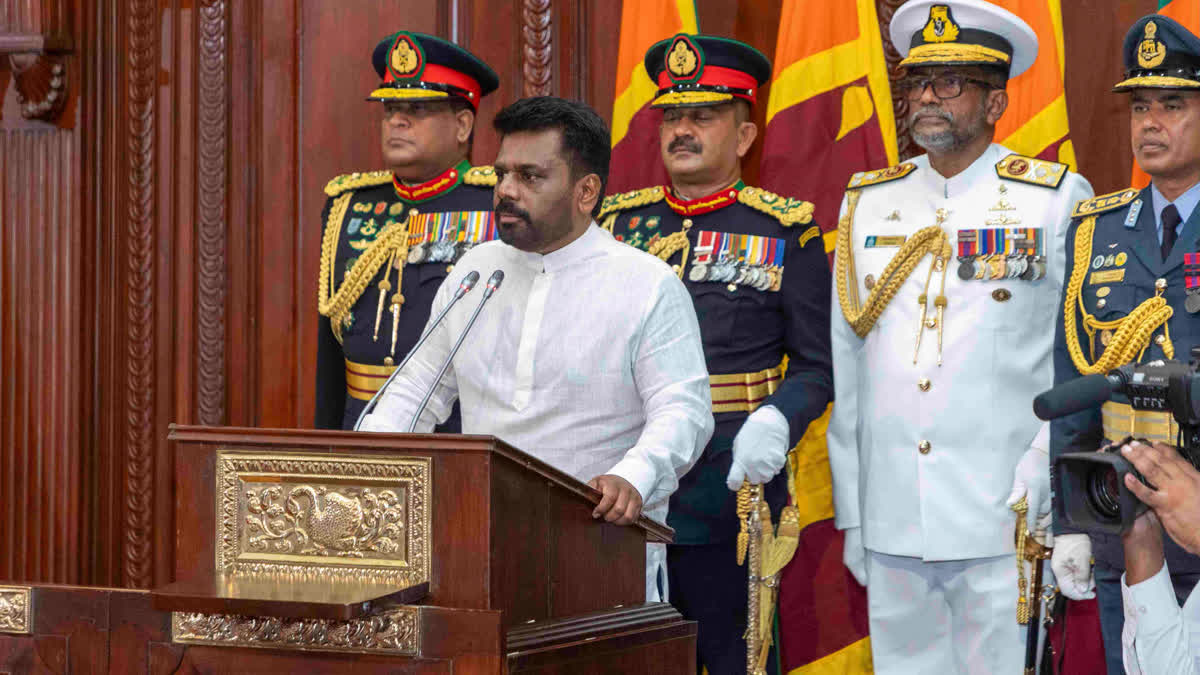COLOMBO, Sri Lanka:The Marxist lawmaker who won Sri Lanka's presidency faces a key challenge in how to balance ties with his country's two most crucial partners, India and China, as he seeks to draw foreign investment and pull the economy out of the doldrums.
Anura Kumara Dissanayake, 55, won the weekend election in an extraordinary political upset against an old political guard that voters blame for tipping the country into its worst economic crisis two years ago. Dissanayake must now deliver on promises to improve Sri Lankans' lives, clean up government and ease austerity measures imposed by international lenders.
But looking beyond Sri Lanka's borders, he also must navigate the rivalry between regional powerhouses India, the country's next-door neighbor, and China, which Dissanayake's party traditionally has leaned toward.
Located on one of the world's busiest shipping routes, Sri Lanka has long been eyed by the two regional rivals. Sri Lanka governments have swung between the two camps, and New Delhi and Beijing have intensely jockeyed for influence in the island nation of 22 million.
"Dissanayake will try to keep both India and China at an equal distance" but his ability to balance them is likely to be tested in the coming weeks, said Veeragathy Thanabalasingham, a Colombo-based political analyst. "It's going to be a tightrope walk," he added.
Indian Prime Minister Narendra Modi and Chinese President Xi Jinping both congratulated Dissanayake soon after he won.
The victory was by the National People's Power coalition led by Dissanayake's People's Liberation Front — also known as Janatha Vimukthi Peramuna, or JVP — which considers itself Marxist, though it now expresses support for a free market economy.
Dissanayake and his party have in the past been seen as more ideologically aligned with China.
Analysts say that could mean drawing more Chinese investment, which slowed after the Sri Lankan government was blamed for taking on too many Chinese loans that added to the country's debt as its economy collapsed in 2022.
Chinese money quickly became a cautionary tale in the country, while the economic crisis allowed India to gain some sway as it stepped in with massive financial and material assistance to its neighbor.
FILE - China's President Xi Jinping, left, waves as he walks with then Sri Lankan President Mahinda Rajapaksa upon arrival at the airport in Colombo, Sri Lanka, Sept. 16, 2014 (AP) Just after Dissanayake was sworn in, Beijing said it wants to work with the new government on boosting development and cooperation in building China's Belt and Road Initiative.
Under Dissanayake, "there's a possibility of more Chinese money coming into Sri Lanka," said Happymon Jacob, founder of the New Delhi-based Council for Strategic and Defense Research, adding that this could concern India.
For New Delhi, Dissanayake and his JVP party could throw up fresh challenges. The party has previously criticized what it called "Indian expansionism" in the region, and Dissanayake has rejected devolving more power to Sri Lanka's north and east, where most of the country's Tamil minority lives - an issue close to India, given the community's cultural links to the country's Tamil Nadu state.
While campaigning, Dissanayake also said he would shut down a wind power project funded by Indian billionaire Gautam Adani who is seen to be close to Prime Minister Narendra Modi, calling it a "corrupt deal."
Indian analysts say that Dissanayake's victory comes as a number of neighboring countries have recently drifted towards Beijing, including Nepal and the Maldives, which now have more pro-China leaders, and Bangladesh, where the ouster of a pro-India leader last month is also testing New Delhi's regional power.
But Chinese grants and lines of credit into South Asia overall have slowed down in the past four years, said Constantino Xavier, senior fellow at the Centre for Social and Economic Progress. This has made countries in the region "realize that they have to reset their relations with India," he added.
FILE - Indian Prime Minister Narender Modi, center left, greets his then Sri Lankan counterpart Mahinda Rajapaksa, during a ceremonial reception at the Indian presidential palace, in New Delhi, India, Feb. 8, 2020. (AP) Similarly, Dissanayake has been pragmatic in his approach towards India so far, with New Delhi also keen to engage.
In February, months before the election was announced, the leader was invited to India where he met with the country's foreign minister. And the Indian envoy in Colombo was the first to meet Dissanayake after the results were announced.
As a neighboring country, "we need to be concerned over India's stability, national interests and national security when taking decisions," Dissanayake told The Associated Press in an interview a few weeks before the election.
"Our main objective is the safety of the region and we will not allow any party to use our land, sea and air to create instability," he added.
In the past, Chinese research ships docked at Sri Lankan ports have stoked security concerns in New Delhi over Beijing's growing influence in the Indian Ocean.
Thanabalasingham, the Colombo-based analyst, said Dissanayake's party has largely transformed into a liberal democratic party for practical purposes so that it is easier to deal with a range of countries and partners. Although he remains head of a Marxist party, he now says he supports a free market economy.
But Dissanayake may need to woo domestic voters who backed him, including a nationalist segment of the population that is anti-India, which could add pressure to court China more.
"He is likely to initially play up China to polish his credentials at home - even if only to extract maximum bargaining power with India," said Xavier.
Read More
- India's Troubled Neighbourhood - What Impact Recent Developments In Sri Lanka, Bangladesh, Nepal Will Have?
- Sri Lankan President Dissanayake Faces Critical Choices Between India and China: Former Diplomat
- Explained | Will Dissanayake Be The Last Executive President Of Sri Lanka?
